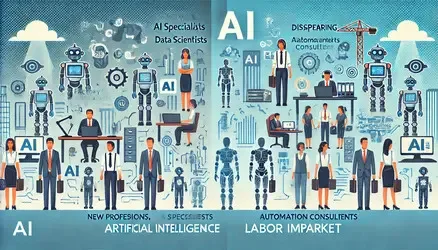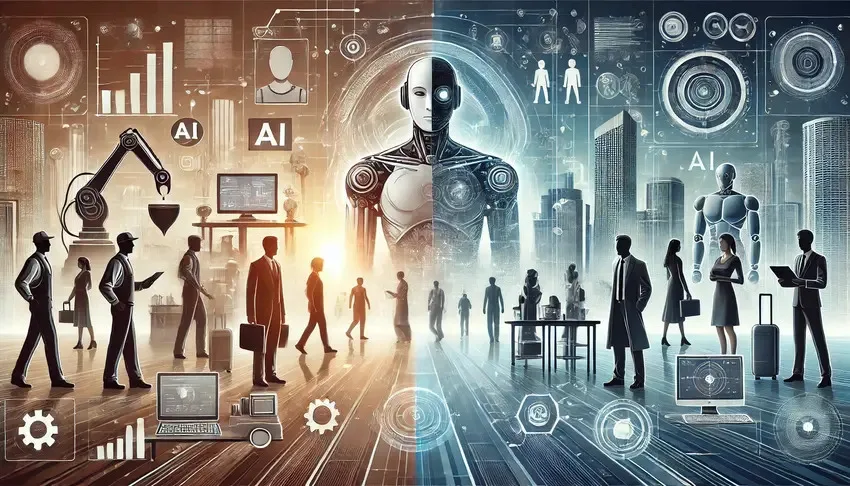The Impact of Artificial Intelligence on the Labour Market: New Professions and Disappearing Professions

Artificial Intelligence (AI) is revolutionizing various sectors, significantly impacting the labor market. As AI continues to advance, it reshapes job landscapes, creating new professions while rendering others obsolete. Understanding these changes is crucial for adapting to the evolving job market and preparing for future challenges.
New Professions Created by AI
The advent of AI has given rise to numerous new professions. One prominent example is the role of AI specialists, including machine learning engineers, data scientists, and AI ethicists. These professionals develop, train, and oversee AI systems, ensuring their effectiveness and ethical use. The demand for AI specialists has surged, with companies across industries seeking expertise to harness AI’s potential.
Another emerging profession is the AI trainer. AI systems, especially those involving natural language processing and image recognition, require extensive training data. AI trainers curate and label this data, providing the necessary inputs for AI models to learn and improve. This role is vital for enhancing AI accuracy and reliability.
Furthermore, AI has spurred the growth of automation consultants. These experts analyze business processes and recommend AI-driven automation solutions to increase efficiency and reduce operational costs. They play a pivotal role in helping organizations transition to AI-powered operations, ensuring a smooth integration of new technologies.
Disappearing Professions
While AI creates new job opportunities, it also leads to the disappearance of certain professions. Jobs involving routine and repetitive tasks are particularly vulnerable. For instance, manufacturing jobs that once required human labor are now increasingly automated. Assembly line workers, for example, are being replaced by robots that can perform tasks faster and with greater precision.
Similarly, administrative and clerical positions are at risk. AI-powered software can handle tasks such as data entry, scheduling, and basic customer service. This automation reduces the need for human intervention, leading to a decline in traditional office jobs.
Even within the service industry, AI’s impact is evident. Automated systems like chatbots and virtual assistants handle customer inquiries and support, diminishing the demand for call center operators. While these technologies improve efficiency, they also contribute to job displacement in sectors reliant on human interaction.

Impact of AI on Existing Occupations
AI’s influence extends beyond creating and eliminating jobs; it also transforms existing occupations. Many professionals now incorporate AI tools into their workflows, enhancing productivity and decision-making processes. For instance, marketers use AI-driven analytics to gain insights into consumer behavior, enabling more targeted and effective campaigns.
In healthcare, AI assists doctors in diagnosing diseases and recommending treatments. Radiologists use AI to analyze medical images, improving diagnostic accuracy and speed. While AI augments these professions, it also necessitates continuous learning and adaptation to new technologies.
Moreover, the role of cybersecurity professionals has evolved with the rise of AI. They now employ AI-driven solutions to detect and counteract cyber threats more efficiently. This shift requires cybersecurity experts to stay abreast of AI advancements and integrate them into their strategies.
Regional Differences in the Impact of AI on the Labour Market
The impact of AI on the labor market varies across regions, influenced by economic development, technological infrastructure, and workforce skill levels. In developed countries, where AI adoption is more advanced, the transition to AI-driven jobs is smoother. These regions often have robust education systems that provide the necessary training for new AI-related professions.
Conversely, developing countries may face greater challenges. The lack of technological infrastructure and limited access to education hinder the adoption of AI technologies. As a result, the impact on traditional jobs might be more pronounced, with fewer opportunities for transitioning to new roles created by AI.
Furthermore, regional policies play a crucial role. Governments that proactively invest in AI research and development, as well as workforce reskilling programs, are better positioned to mitigate the negative effects of AI on employment. Policies that promote innovation and entrepreneurship also help in creating new job opportunities in the AI-driven economy.


